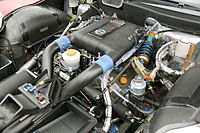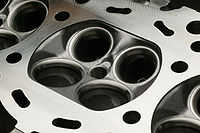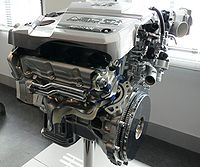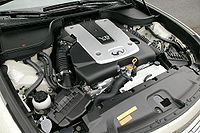- Nissan VQ engine
-
Nissan VQ engine 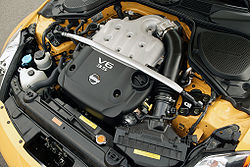
Manufacturer Nissan Motors Production 1994– Predecessor Nissan VE engine
Nissan VG engineConfiguration 60° V6 Displacement 2.0L
2.3L
2.5L
3.0L
3.5L
3.7L
4.0LCylinder block alloy Aluminum Cylinder head alloy Aluminum Valvetrain DOHC The VQ is a V6 piston engine produced by Nissan with displacements varying from 2.0 L to 4.0 L. It is an aluminum block DOHC 4-valve design with aluminum heads. It is fitted with Nissan's EGI/ECCS sequential multi-point fuel injection (MPFI) system. Later versions feature various implementations of variable valve timing and replace MPFI with direct fuel injection (marketed as NEO-Di). The VQ series engine was honored by Ward's 10 Best Engines list almost every year from the list's inception. The VQ series replaced the VG series of engines.
Contents
DE series
VQ20DE
This DOHC 24-valve 2.0 L (1995 cc) V6 has bore and stroke dimensions of 76 mm and 73.3 mm respectively, along with a compression ratio ranging from 9.5 to 10.0:1. It produces 150 PS (110 kW; 150 hp) to 160 PS (120 kW; 160 hp) @6400 rpm and 137 to 145 ft·lbf (186 to 197 N·m) @4400 rpm (lean burn).
It is fitted to the following vehicles:
- 1994–2003 Nissan Cefiro A32 and A33
- 1995–1999 Nissan QX A32
VQ23DE
The VQ23DE is a 2.3 L (2349 cc) engine equipped with CVTC (Continuously Variable-valve Timing Control). Bore and stroke are 85 mm and 69 mm, with a compression ratio of 9.8:1. It produces 173 PS (127 kW; 171 hp) @6000 rpm and 166 ft·lbf (225 N·m) @4400 rpm.
It is fitted to the following vehicles:
- 2003–2008 Nissan Teana 230JM-J31
- 2006–present Renault Samsung SM7 170 PS (130 kW; 170 hp) (Neo VQ23)
- 2008–present Renault Safrane 170 PS (130 kW; 170 hp) (Neo VQ23)
VQ25DE
This engine is similar to the VQ20DE, but has a 2.5 L (2495 cc) displacement. Bore and stroke are 85 mm and 73.3 mm, with a compression ratio of 9.8 to 10.3:1. It produces 190 PS (140 kW; 190 hp) to 210 PS (150 kW; 210 hp) @6400 rpm and 174 to 195 ft·lbf (236 to 264 N·m) of torque. Later versions produce 186 PS (137 kW; 183 hp) @6000 rpm and 171 ft·lbf (232 N·m) @3200 rpm.
It is fitted to the following vehicles:
- 1994–1998 Nissan Cefiro A32
- 2000–2003 Nissan Cefiro A33
- 1996–1999 Nissan Leopard FY33
- 1997–1999 Nissan Cedric Y33
- 2004–2007 Nissan Fuga 250GT & 250XV Y50
- 2004–2010 Nissan Elgrand E51
- 2008–present Nissan Teana J32
- 2010–present Renault Samsung SM5(L43) (178ps)
- 2010–present Renault Latitude (L43) (178ps)
VQ25DET
The VQ25DET is a turbocharged 2.5 L (2495 cc) engine with CVTC. Bore and stroke are 85 mm and 73.3 mm, with a compression ratio of 8.5:1. It produces 280 PS (210 kW; 280 hp) @6400 rpm and 300 ft·lbf (410 N·m) @3200 rpm.
It is fitted to the following vehicles:
- 2001–2004 Nissan Stagea 250t RS FOUR V, 250t RX FOUR and AR-X FOUR (NM-35)
VQ30DE
The 3.0 L (2987 cc) VQ30DE has a bore and stroke of 93 mm and 73.3 mm respectively with a compression ratio of 10.0:1. It produces 193 PS (142 kW; 190 hp) to 230 PS (170 kW; 230 hp) @ 6400 rpm and 205 to 217 ft·lbf (278 to 294 N·m) @4400 rpm. The VQ30DE was on the Ward's 10 Best Engines list from 1995 through 2001. It is an aluminum open deck block design with microfinished internals and a relatively light weight.
An improved version of the VQ30DE is known by the designation VQ30DE-K. The K designation stands for the Japanese word kaizen which translates to "improvement". The engine was used in the 2000–2001 Nissan Maxima and adds a true dual-runner intake manifold for better high-end performance compared to some earlier Japanese and Middle-East market versions of this engine. The VQ30DEK produces 226 PS (166 kW; 223 hp). The 1995–1999 US spec VQ30DE was equipped with only a single runner intake manifold.
It is fitted to the following vehicles:
- 1994–1998 Nissan Cefiro (A32), 220 PS (160 kW; 220 hp) and 206 ft·lbf (279 N·m)
- 1995–1999 Nissan QX (A32)
- 1995–1999 Nissan Maxima (A32), 192 PS (141 kW; 189 hp) and 205 ft·lbf (278 N·m)
- 1996–1999 Infiniti I30 (A32), 192 PS (141 kW; 189 hp) and 205 ft·lbf (278 N·m)
- 2000–2001 Nissan Maxima (A33), 225 PS (165 kW; 222 hp) and 217 ft·lbf (294 N·m); 227 PS (167 kW; 224 hp) for Anniversary Edition SE
- 2000–2001 Infiniti I30 (A33), 230 PS (170 kW; 230 hp) and 217 ft·lbf (294 N·m)
- 1999–2003 Nissan Bassara U30, 223 PS (164 kW; 220 hp) and 206 ft·lbf (279 N·m)
- 1998–2003 Nissan Presage U30, 223 PS (164 kW; 220 hp) and 206 ft·lbf (279 N·m)
VQ30DET
The 3.0 L (2987 cc) VQ30DET is a turbocharged version of the VQ30DE. Bore and stroke remain the same at 93 mm and 73.3 mm respectively, and it has a compression ratio of 9.0:1. It produces 270 PS (200 kW; 270 hp) and 271 ft·lbf (367 N·m). From 1998 onwards, it produces 280 PS (210 kW; 280 hp) @6000 rpm and 285 ft·lbf (386 N·m) @3600 rpm.
It is fitted to the following vehicles:
- 1995–2004 Nissan Gloria Y33,Y34
- 1995–2004 Nissan Cedric Y33,Y34
- 1997–1999 Nissan Leopard Y33
- 2001–present Nissan Cima F50
VQ30DETT
The twin-turbo VQ30DETT is an engine used only in Nissan's race cars, primarily in the Super GT (formerly the JGTC). First used on the Skyline GT-R race cars during the 2003 season, this engine subsequently powered the Fairlady Z race cars. Homologation rules allow them to use the VQ30DETT in lieu of the stock VQ35DE. Race output of this engine is estimated at around 480 PS (350 kW; 470 hp).
The VQ30DETT was replaced in 2007 by the VK45DE for use in the Super GT Fairlady Z's and later in the GT-R.
It was utilized in the following vehicles:
- 2003 Skyline GT-R JGTC race cars (Non-Production)
- 2004 Fairlady Z JGTC race cars (Non-Production)
- 2005–2006 Fairlady Z Super GT race cars (Non-Production)
VQ35DE
The 3.5 L (3498 cc) VQ35DE is used in many modern Nissan vehicles. Bore and stroke are 95.5 mm and 81.4 mm. It uses a similar block design to the VQ30DE, but adds variable valve timing. It produces from 231 PS (170 kW; 228 hp) to 304 PS (224 kW; 300 hp) of power and 246 to 274 ft·lbf (334 to 371 N·m) of torque depending on the application.
The VQ35DE is built in Iwaki and Decherd, TN. It was on the Ward's 10 Best Engines list from 2002 through to 2007. It features forged steel connecting rods, a microfinished one-piece forged crankshaft, and Nissan's nylon intake manifold technology. It has low-friction molybdenum-coated pistons and the intake is a high-flow tuned induction system. Since its inception Nissan has improved upon the VQ35DE with changes keeping it an efficient class leading V6 engine.
A modified version of the VQ35DE, called the S1, is produced by Nismo (Nissan's motorsports and performance division) for the Fairlady Z S-Tune GT. It produces 300 PS (220 kW; 300 hp) at 7,200 rpm, a higher rev-limit than that of the original VQ35DE. The 350Z GT-S concept has a VQ35DE equipped with a switchable Novidem supercharger, producing around 382 PS (281 kW; 377 hp) with a supercharger.
It is fitted to the following vehicles: North American
- 2001–2004 Nissan Pathfinder (240 hp)
- 2001–2004 Infiniti QX4 (240 hp)
- 2002–2004 Infiniti I35 (255 hp)
- 2002–present Nissan Altima (240 to 270 hp)
- 2002–present Nissan Maxima (255 to 290 hp)
- 2003–2006 Nissan 350Z (287 to 300 hp)
- 2003–2004 Infiniti G35 (260 to 280 hp) all models
- 2005–2006 Infiniti G35 (280 hp) automatic transmission models
- 2005–2007 Infiniti G35 (298 hp) manual transmission models
- 2003–2008 Infiniti FX35 (275 hp)
- 2003–present Nissan Murano (Z50) (245 to 265 hp)
- 2004–present Nissan Quest (235 to 260 hp)
- 2006–2008 Infiniti M35 (275 hp)
JDM and other markets
- 2000–present Nissan Elgrand 240 PS (180 kW; 240 hp)
- 2001–2007 Nissan Stagea 272 PS (200 kW; 268 hp) and above
- 2001–2009 Renault Vel Satis 241 PS (177 kW; 238 hp)
- 2002–2008 Nissan Skyline (V35) 272 PS (200 kW; 268 hp) and above
- 2003–present Nissan Teana/Cefiro (350JM-J31) 231 PS (170 kW; 228 hp)
- 2003–2009 Nissan Presage (231 hp)
- 2003–present Renault Espace 241 PS (177 kW; 238 hp)
- 2004–2007 Nissan Fuga 350 GT 280 PS (210 kW; 280 hp)
- 2005–2008 Nismo Fairlady Z S-Tune GT 300 PS (220 kW; 300 hp) (VQ35DE S1 engine)
- 2006–present Renault Samsung SM7 217 PS (160 kW; 214 hp) (Neo VQ35)
- 2008–present Renault Laguna Coupé 241 PS (177 kW; 238 hp)
VQ40DE
The VQ40DE is a 4.0 L (3954 cc) variant of the VQ35DE due to a longer stroke. Bore and stroke are 95.5 × 92.0 mm.
Improvements include continuously variable valve timing, variable intake system, silent timing chain, hollow and lighter camshafts and friction reduction (microfinished surfaces, moly coated pistons). It has Nissan's direct ignition system with platinum-tipped spark plugs. It produces 265 PS (195 kW; 261 hp) to 274 PS (202 kW; 270 hp) @5600 rpm and 281 ft·lbf (381 N·m) to 291 ft·lbf (395 N·m) @4000 rpm.
It is fitted to the following vehicles:
- 2005–present Nissan Frontier (261 hp @5600 rpm; 281 ft·lbf (381 N·m) @4000 rpm)
- 2005–present Nissan Xterra (261 hp @5600 rpm; 281 ft·lbf (381 N·m) @4000 rpm)
- 2005–present Nissan Pathfinder (270 hp @5600 rpm; 291 ft·lbf (395 N·m) @4000 rpm)
- 2009–present Suzuki Equator (261 hp @5600 rpm; 281 ft·lbf (381 N·m) @4000 rpm)
DD series
It is a variant of DE series engines with direct fuel injection (NEO-Di) and eVTC (electronically controlled continuously variable valve timing).
VQ25DD
The 2495cc engine has Bore and stroke of 85 mm and 73.3 mm respectively, with a compression ratio of 11 to 11.3:1. It produces 210 PS (150 kW; 210 hp) to 215 PS (158 kW; 212 hp) @6400 rpm and 195 to 199 ft·lbf (264 to 270 N·m) @4400 rpm.
It is fitted to the following vehicles:
- 1999–2002 Nissan Cefiro A33, 210 PS (150 kW; 210 hp) (JDM)
- 1999–2004 Nissan Cedric/Nissan Gloria
- 2001–2006 Nissan Skyline V35, 210 PS (150 kW; 210 hp)
- 2001–2007 Nissan Stagea M35, 215 PS (158 kW; 212 hp)
VQ30DD
The 2987cc engine has Bore and stroke of 93 mm and 73.3 mm, with a compression ratio of 11.0:1. It produces 230 PS (170 kW; 230 hp) to 260 PS (190 kW; 260 hp) @6400 rpm and 217 to 239 ft·lbf (294 to 324 N·m) @3600 rpm.
It is fitted to the following vehicles:
- 1997–1999 Nissan Leopard Y33 230 PS (170 kW; 230 hp) and 217 ft·lbf (294 N·m)
- 1999–2004 Nissan Cedric Y34
- 1999–2004 Nissan Gloria Y34 240 PS (180 kW; 240 hp) and 228 ft·lbf (309 N·m)
- 2001–2004 Nissan Skyline V35
- 2001–2004 Nissan Stagea M35 260 PS (190 kW; 260 hp) and 239 ft·lbf (324 N·m)
HR series
VQ25HR
The 2.5 L VQ25HR (for "High Revolution" or "High Response") is only offered on longitudinally-mounted engine vehicles which tend to be rear wheel drive or all-wheel drive. Bore and stroke are 85 mm and 73.3 mm, with a compression ratio of 10.3:1. It produces 235 PS (173 kW; 232 hp) @6,800 rpm and 194 ft·lbf (263 N·m) @4,800 rpm. It has dual CVTC for both intake and exhaust, microfinished camshafts and a redline of 7,500 rpm.
It is fitted to the following vehicles:
- 2006–present Nissan Skyline V36 250GT Sedan - 235 PS (173 kW; 232 hp)
- 2007–present Nissan Fuga 250GT - 223 PS (164 kW; 220 hp)
- 2011–present Infiniti G V36 G25 Sedan - 218 hp (163 kW)
- 2010–present Infiniti EX J50 EX25 Crossover SUV - 235 PS (173 kW; 232 hp)
VQ35HR
The VQ35HR update was first seen in the US in the 2007 G35 Sedan models, which debuted in August 2006. Nissan updated the VQ line with the addition of the 3.5 L VQ35HR (for "High Revolution" or "High Response"). It produces 315 PS (232 kW; 311 hp) (US market: 306HP due to new US federal measurement regulations) at 6,800 rpm and 37 kg·m (363 N·m; 268 ft·lbf) at 4,800 rpm, using a compression ratio of 10.6:1. As of 2009, the Infiniti EX35 produces 297 hp and the same torque presumably due to tighter regulations. It has NDIS (Nissan Direct Ignition System) and CVTC with hydraulic actuation on the intake cam and electromagnetic on the exhaust cam. Redline is 7,500 rpm. Reportedly over 80% of the internal components were redesigned or strengthened to handle an increased RPM range sporting a lofty 7,500 rpm redline. A new dual-path intake (two air cleaners, throttle bodies, etc.) lowers intake tract restriction by 18 percent and new equal-length exhaust manifolds lead into mufflers that are 25 percent more free-flowing for all around better airflow. The new intake is said to benefit from a ram-air effect adding three horsepower at 60 mph (not accounted for by SAE testing methods). The electrically actuated variable valve timing on the exhaust cams to broaden the torque curve is new over the "DE" engine. The new engine block retains the same bore and stroke, but the connecting rods were lengthened and the block deck was raised by 8.4 mm to reduce piston side-loads. This modification, along with the use of larger crank bearings with main bearing caps reinforced by a rigid ladder-type main cap girdle to allow the engine reliably rev to 7500 rpm. With an increase in compression ratio from 10.3:1 to 10.6:1 these changes add 6 more horsepower (306 total + 3 hp ram air effect not measured by SAE testing = 309 hp). Peak torque is up 8 pound-feet from the old "DE" engine (260 vs. 268) and the torque curve is higher and flatter across most of the rpm range, and especially in the lower rpm range.
The VQ35HR fitted to the following vehicles:
- 2007–2008 Infiniti G35 Sedan
- 2007–2008 Nissan Skyline V36 350GT Sedan
- 2007–2009 Nissan 350Z
- 2006–2009 Nissan Fuga 350 GT
- 2008–present Infiniti EX35 Crossover SUV
- 2009–present Infiniti FX35 Crossover SUV
- 2009–2010 Infiniti M35
- 2011–present Infiniti M35h (hybrid variant)
- 2010–present Nissan Fuga Hybrid
VHR series
It is a variation of the VQ-HR engine series with Nissan's VVEL (Variable Valve Event and Lift).
VQ37VHR
It was the first production engine from Nissan using VVEL. It has an increased compression ratio of 11.0:1, with 3,696 cc (225.5 cu in) displacement (95.5mm bore and 86mm stroke), while redline remains at 7600RPMs. It is rated at 337 PS (248 kW; 332 hp) at 7,000rpm and 37.2 kg·m (365 N·m; 269 ft·lbf) at 5200rpm. Although the engine gains only 0.2 kg·m (2 N·m; 1 ft·lbf) peak torque over the VQ35HR and this higher torque arrives at 5200 rpm vs. 4800 in the VQ35HR, the torque curve itself is improved and flattened via VVEL variable valve timing for better throttle response and low rpm torque. The VQ37VHR engine has been touted by car magazines and reviewers as an improvement over the VQ35HR engine mostly adding much refinement and smoother engine operation, especially at high rpm where the VQ35HR engine was frequently criticized for NVH and sounding strained, harsh and loud.
It is fitted into the following vehicles:
- 2008–present Infiniti G37 Coupe
- 2008–present Nissan Skyline V36 370 GT Coupe
- 2009–present Infiniti G37 Sedan
- 2009–present Nissan Skyline V36 370 GT Sedan
- 2009–present Nissan Fuga 370GT
- 2009–present Infiniti FX37
- 2009–present Infiniti EX37
- 2009–present Nissan 370Z/Fairlady Z (332 hp)
- 2009–present Nismo 370Z (350 hp)
- 2011–present Infiniti M37 (330 hp)
- 2011–present Infiniti IPL G37 Coupe (348 hp)
See also
Sources
- "Powerful Pair: Nissan says new V6 engines increase power, fuel economy". AutoWeek. http://autoweek.com/apps/pbcs.dll/article?AID=/20060829/FREE/60828028/1024/LATESTNEWS. Retrieved August 29, 2006.
IMSA GTU (1979–1993) IMSA GTO/GTS (1981–1995) Group 5 (1979–1984) WSC / JSPC (1985–1992) IMSA GTP (1985–1993) Le Mans (1997–1999) JGTC / Super GT (1993–2010) Skyline GT-R · Silvia · Fairlady Z (Z33) · GT-R ·
FIA GT1 (2010-) Nissan Motor Company Vehicles Current370Z • Advan • Altima • Aprio • Armada • Atlas • Bluebird • Bluebird Sylphy • Cabstar • Caravan • Civilian • Clipper • Cube • Dualis • Elgrand • Frontier • Freeson • Fuga • GT-R • Juke • Lafesta • Leaf • Livina Geniss • Maxima • March • Murano • Moco • Navara • Note • NV200 • NV400 • Otti • Paladin • Pathfinder • Patrol • Qashqai • Quest • Rogue • Safari • Sentra • Serena • Skyline • Teana • Tiida • Titan • Urvan • Versa • Wingroad • X-Trail • XterraPastDC-3 • 100NX • 1200 • 310 • 180SX • 200SX • B-210 • 240SX • 240Z • 280ZX • 300C • 300ZX • 350Z • 510 • 810 • Almera • Almera Tino • Altra (EV) • Avenir • Auster • Bassara • Be-1 • Caball • Cablight • Cedric • Cefiro • Cherry • Cima • Crew • Datsun Truck • Echo • Expert • Fairlady • Figaro • Gazelle • Gloria • Hardbody Truck • Hypermini • Homy • Interstar • Junior • Largo • Laurel • Leopard • Liberty • Mistral • Multi • NX • Pao • Pintara • Pino • Platina • Prairie • Presage • Presea • Primera • President • Pulsar • Pulsar GTI-R • R390 GT1 • R'nessa • Rasheen • Roadster-Road Star • S-Cargo • Saurus • Saurus Jr • Silvia • Sileighty • Skyline GT-R • Stanza • Stagea • Sunny • Terrano • Terrano II • Vanette • VioletConcept126X • 216X • 270X • 300 Bambu • 315-a • AA-X • Actic • AD-1 • AD-2 • AL-X • Alpha T • Amenio • AQ-X • AP-X • ARC-X • AXY • AZEAL • Bevel • Boga • C-Note • Chapeau • Chappo • Cocoon • CQ-X • Crossbow • CUE-X • Cypact • Duad • Dunehawk • Effis • ESV • Evalia • EV Guide II • EV Truck • FEV • FEV-II • Foria • Forum • Fusion • Gobi • GR-1 • GR-2 • GT-R • ideo • Intima • Jikoo • Judo • Jura • Kino • KYXX • Land Glider • LEAF • LUC-2 • MID4 • Mixim • mm.e • Moco • Nails • NCS • NEO-X • NRV-II • NX-21 • NV2500 • Pivo • Pivo 2 • Qazana • Redigo • Round Box • Serenity • Sport Concept • Stylish VI • Terranaut • Tone • Townpod • Trailrunner • TRI-X • URGE • UV-X • XIX • XVL • Yanya • ZarootEngines GRX-3 • UD12 • VRT35Marques Nissan • InfinitiSubsidiaries
and divisionsSee also ATTESA • Datsun • HICAS • Prince • Renault-Nissan Alliance • Nissan Shatai • UD Nissan Diesel • VVL • VVEL • dCi
Categories:- Nissan engines
Wikimedia Foundation. 2010.




